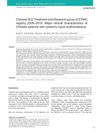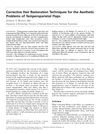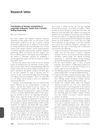19 citations,
March 2018 in “JAMA” Treat hirsutism in premenopausal women with oral contraceptives and consider additional treatments if needed.
 17 citations,
June 2020 in “British Journal of Dermatology”
17 citations,
June 2020 in “British Journal of Dermatology” Oral mTOR inhibitors often cause skin and hair side effects but usually don't require stopping treatment.
 17 citations,
August 2015 in “Expert Opinion on Pharmacotherapy”
17 citations,
August 2015 in “Expert Opinion on Pharmacotherapy” The document concludes that oral finasteride and topical minoxidil are effective for genetic hair loss, while other treatments for different types of hair loss show promise but need more research.
16 citations,
April 2017 in “Pediatric Dermatology” Oral isotretinoin effectively treated the man's painful scalp condition and hair loss.
16 citations,
November 2008 in “Journal of the American Academy of Dermatology” Consider necrolytic acral erythema in similar cases and treat with oral zinc sulfate.
 15 citations,
March 2021 in “Rheumatology and Immunology Research”
15 citations,
March 2021 in “Rheumatology and Immunology Research” Chinese patients with systemic lupus erythematosus commonly experience oral ulcers, arthritis, alopecia, skin rash, and nephritis.
 14 citations,
September 2015 in “Expert Opinion on Therapeutic Targets”
14 citations,
September 2015 in “Expert Opinion on Therapeutic Targets” The conclusion is that while oral contraceptive pills are effective for PCOS-related high androgen levels, new treatments with fewer side effects are needed.
 13 citations,
June 2018 in “Journal of Womens Health”
13 citations,
June 2018 in “Journal of Womens Health” Combination therapy with oral contraceptives and spironolactone improves hair growth, menstrual issues, and acne in women with PCOS.
 13 citations,
September 2011 in “American Journal of Clinical Dermatology”
13 citations,
September 2011 in “American Journal of Clinical Dermatology” The oral contraceptive ethinylestradiol/chlormadinone acetate is effective in reducing acne and improving other skin conditions related to high androgen levels.
 12 citations,
May 2017 in “Journal of Dermatological Treatment”
12 citations,
May 2017 in “Journal of Dermatological Treatment” Adult acne severity is influenced by stress, skin sensitivity, makeup, stopping oral contraceptives, and requires female-specific treatment guidelines.
 12 citations,
May 2017 in “Medicine”
12 citations,
May 2017 in “Medicine” Oral isotretinoin was recommended for a 21-year-old woman with severe acne.
11 citations,
July 2018 in “AJGP” Low-dose oral minoxidil effectively reduces hair loss in women with female pattern hair loss.
 10 citations,
April 2018 in “Actas Dermo-Sifiliográficas”
10 citations,
April 2018 in “Actas Dermo-Sifiliográficas” In 2017, Spanish dermatologists most often prescribed minoxidil and finasteride for male hair loss, and minoxidil and oral contraceptives for premenopausal female hair loss.
 10 citations,
May 2017 in “CMAJ. Canadian Medical Association journal”
10 citations,
May 2017 in “CMAJ. Canadian Medical Association journal” The boy had a fungal scalp infection called kerion, which was cured with oral antifungal medication.
 9 citations,
May 2005 in “Annales de dermatologie et de vénéréologie”
9 citations,
May 2005 in “Annales de dermatologie et de vénéréologie” Oral zinc and topical steroids can effectively treat chronic scalp pustules and hair loss in elderly patients.
8 citations,
May 1991 in “PubMed” Hirsutism requires identifying the cause to choose the right treatment, which may include medications like oral contraceptives or dexamethasone.
 7 citations,
April 2023 in “Frontiers in immunology”
7 citations,
April 2023 in “Frontiers in immunology” Oral baricitinib and ruxolitinib are effective and safe for treating alopecia areata.
 7 citations,
May 2022 in “The Journal of Dermatology”
7 citations,
May 2022 in “The Journal of Dermatology” Hair loss is a frequent long-term effect of COVID-19, and oral minoxidil is the most common effective treatment.
 7 citations,
August 2020 in “Scientifica”
7 citations,
August 2020 in “Scientifica” Most HIV-positive patients had skin problems, and conditions like oral thrush and boils were linked to weaker immune systems.
 7 citations,
January 2007 in “PubMed”
7 citations,
January 2007 in “PubMed” Women with androgenetic alopecia (AGA) are more insulin resistant than healthy women, with various insulin sensitivity indices being higher in the AGA group. An oral glucose tolerance test is suggested for women with AGA.
 6 citations,
March 2003 in “Dermatologic Surgery”
6 citations,
March 2003 in “Dermatologic Surgery” Dr. Dominic A. Brandy developed successful techniques to fix unnatural looks caused by old hair restoration methods, and using oral finasteride and topical minoxidil can help control hair loss in most men.
 6 citations,
October 2000 in “International Journal of Dermatology”
6 citations,
October 2000 in “International Journal of Dermatology” Preventing hair loss is more effective than regrowth; oral finasteride is a realistic option.
 5 citations,
March 2023 in “Journal of the American Academy of Dermatology”
5 citations,
March 2023 in “Journal of the American Academy of Dermatology” Prurigo pigmentosa mainly affects middle-aged White and Asian women, often linked to a ketogenic diet, and is best treated with oral antibiotics.
 5 citations,
June 2018 in “Actas Dermo-Sifiliográficas”
5 citations,
June 2018 in “Actas Dermo-Sifiliográficas” In 2017, Spanish dermatologists commonly prescribed topical minoxidil, oral finasteride, and nutricosmetics for hair loss, with oral contraceptives also used for premenopausal women. Less common were oral dutasteride, due to side effects, and newer, more expensive treatments like topical finasteride and Low-Level Laser Therapy. The conclusion is that there's a need for prescription guidelines due to varied treatment approaches.
 5 citations,
August 2015 in “British journal of dermatology/British journal of dermatology, Supplement”
5 citations,
August 2015 in “British journal of dermatology/British journal of dermatology, Supplement” The top research priorities for congenital ichthyosis include long-term side effects of oral retinoids, best topical treatments, and treatments for itch and hair loss.
 5 citations,
March 2014 in “Journal of The American Academy of Dermatology”
5 citations,
March 2014 in “Journal of The American Academy of Dermatology” The study suggests hormonal factors may play a role in Frontal Fibrosing Alopecia and that treatments like oral antiandrogens and steroids could be beneficial.
 3 citations,
November 2021 in “Journal of The American Academy of Dermatology”
3 citations,
November 2021 in “Journal of The American Academy of Dermatology” Androgenetic alopecia, a genetic disorder affecting up to 50% of adults, is caused by an excessive response to androgens leading to hair follicle shrinkage. Treatments include FDA-approved drugs, other therapies like low-dose oral minoxidil, and hair transplantation.
 3 citations,
January 2020 in “Skin appendage disorders”
3 citations,
January 2020 in “Skin appendage disorders” In Spain, dermatologists most commonly prescribe topical minoxidil and oral finasteride for male hair loss, and topical minoxidil and oral contraceptives for female hair loss. The use of oral dutasteride and oral minoxidil has significantly increased over the past three years.
 3 citations,
October 2009 in “Iranian Journal of Basic Medical Sciences”
3 citations,
October 2009 in “Iranian Journal of Basic Medical Sciences” Buxus wallichiana extract improves hair growth and has antioxidant properties, with oral use more effective than topical.
 3 citations,
March 2007 in “Canadian Medical Association Journal”
3 citations,
March 2007 in “Canadian Medical Association Journal” Women with PCOS should have an oral glucose tolerance test for effective diabetes screening.
























